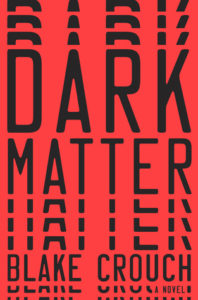Here are some of the articles that got me thinking over the past week.
On Impact
Stephen King experienced (celebrated doesn’t seem like the appropriate word) an anniversary last week: 20 years since the automobile accident that nearly killed him. He wrote this article for The New Yorker a year after the accident.
The Weird, Twisted Science of Blake Crouch’s Sci-Fi Thrillers

I loved Dark Matter by Blake Crouch and have just read (though not yet reviewed) his newly released novel, Recursion, which this interview calls “another particle collider of narrative ambition.” In the interview for Goodread Crouch discusses “the new book, the nature of memory, and the cosmic implications of déjà vu.”
How Has the Internet Changed Book Culture?
On June 12 the Center for Publishing at NYU’s School of Professional Studies in conjunction with Publishers Weekly hosted a PubTechConnect event entitled “Book Lovers on the Internet: Connecting with Readers in Digital Ways.”
The group discussed a wide range of internet-focused book-related topics, including whether the internet has changed literary culture for the better or worse, how to effectively use social media to talk about (or promote) books online, how book criticism has changed in the digital era, and which authors were best at using social media as part of their work or brand.
“If there was one major takeaway from the evening, it was that all of the panelists believed that the internet has served to expand literary culture and its reach.”
“Never let anyone tell you there are no words”
We all process grief in different ways. For Jayson Greene, who lost his two-year-old daughter due to a freak accident, it was to take pen to paper. The result is Once More We Saw Stars, a memoir so moving and powerful, it “[restores Greta] ever-so-briefly to the world.” Here, Greene argues that there are words to express unimaginable loss, and how healing it can be to use them.
Comfort by Ann Hood is another memoir written under similar circumstances.
A DISCUSSION ON WOMEN IN CRIME FICTION
Two veteran women crime writers, Rene Denfeld and Gilly Macmillan, “discuss the wave of new women crime writers—and if being a woman has changed how they write about violence and crime.”
Denfeld says, “Writing about violence can be a way for us to explore what it means, where violence comes from, and what we can do to prevent it.”
Both writers emphasize the need for fully developed characters on both sides of the violence equation, both the victims and the perpetrators. Since women have historically suffered the effects of violence, the current push of crime fiction written by women aims to demonstrate resilience rather than simply victimization.
Macmillan says, “Crime fiction can delve deep into current societal issues and does it best when those issues strike a universal chord, giving us an opportunity to connect with readers in a very visceral way.”
Jennifer Weiner was right about sexism, media and women writers: “We were told we were lying”
Author Jennifer Weiner has “spent nearly a decade challenging the elitism and sexism of book publishing and criticism. Her new novel, “Mrs. Everybody” is a culmination of Weiner’s work as both a storyteller and a truth-teller, a sweeping multigenerational family saga against a backdrop of 70 years of women’s history.”
In this interview in Salon she discusses her new novel, Mrs. Everything, a multigenerational novel about women and families, and the inequality between men and women in the publishing industry.
Here are some of Weiner’s major points:
- “women’s stories can be big stories, even though we are not taught to think of them that way.”
- “We read men in school and we were taught that that was Literature, with a capital L. We read books by men. Men did not grow up reading books by women in school and believing that that was literature.”
- “I wanted readers [of Weiner’s latest novel, Mrs. Everything] to think about the importance of naming things. How once you’ve got a term for something or a word for something or a language for something, that’s when you can start to solve it. That’s when you can start to fix it.”
© 2019 by Mary Daniels Brown

